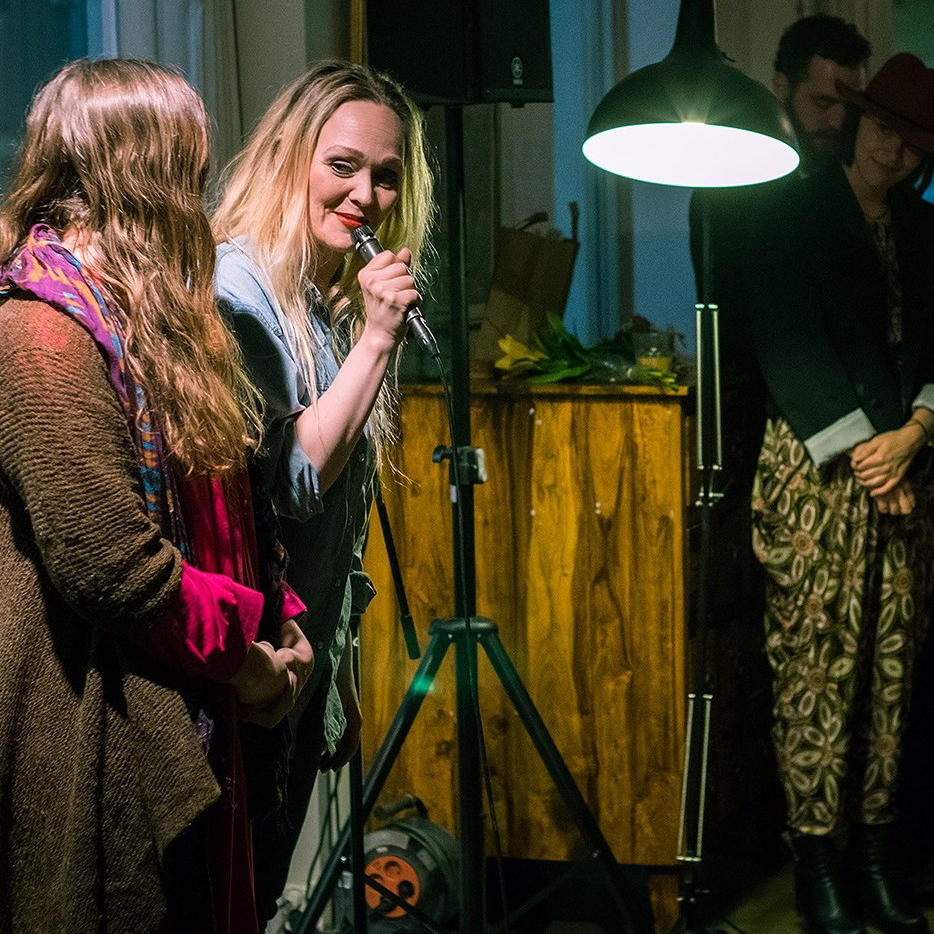
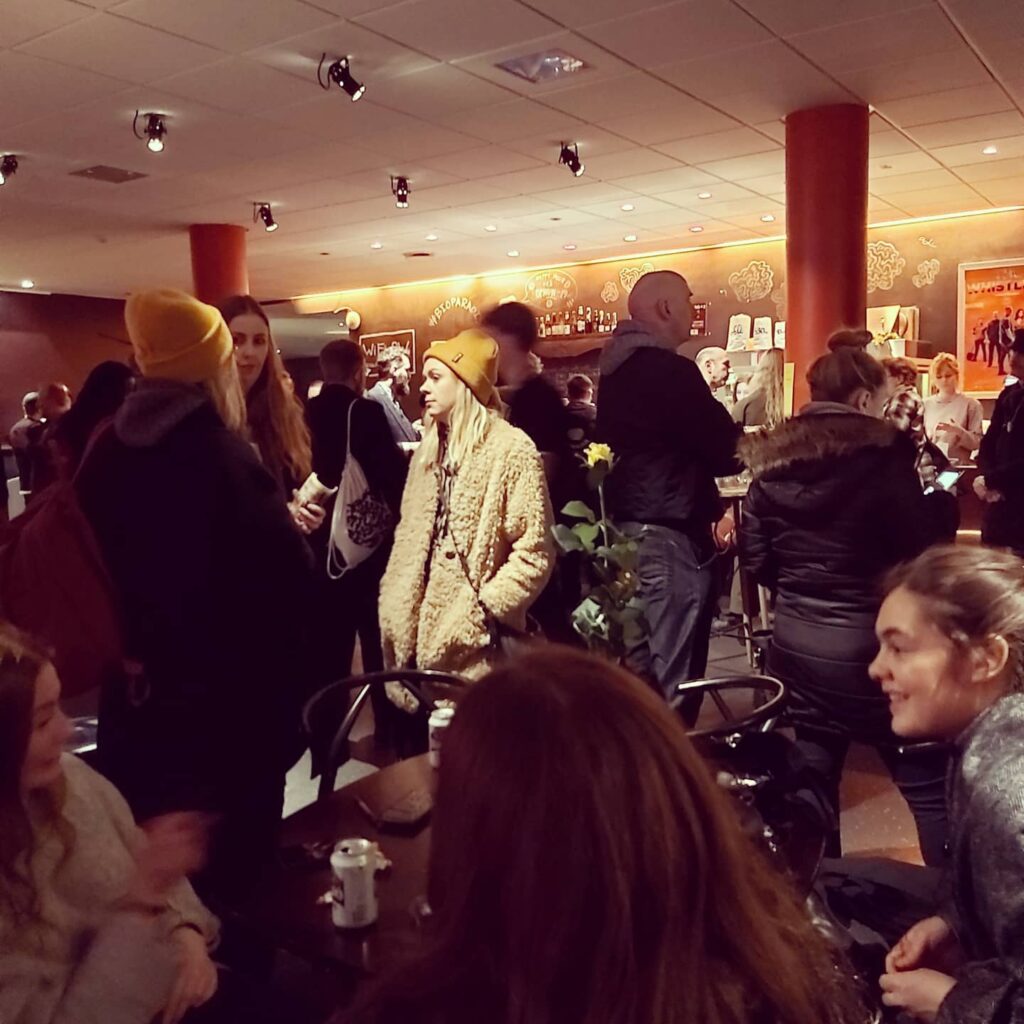
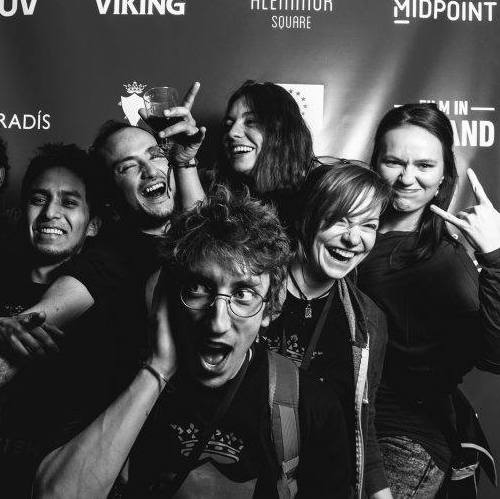
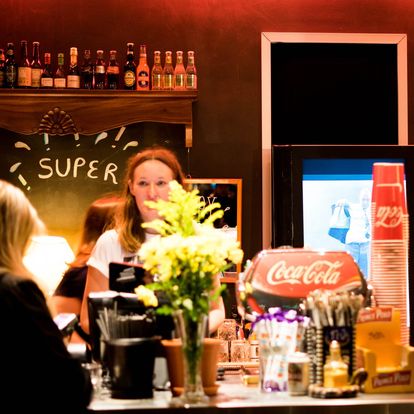
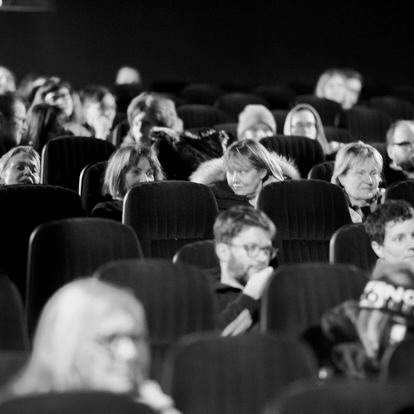
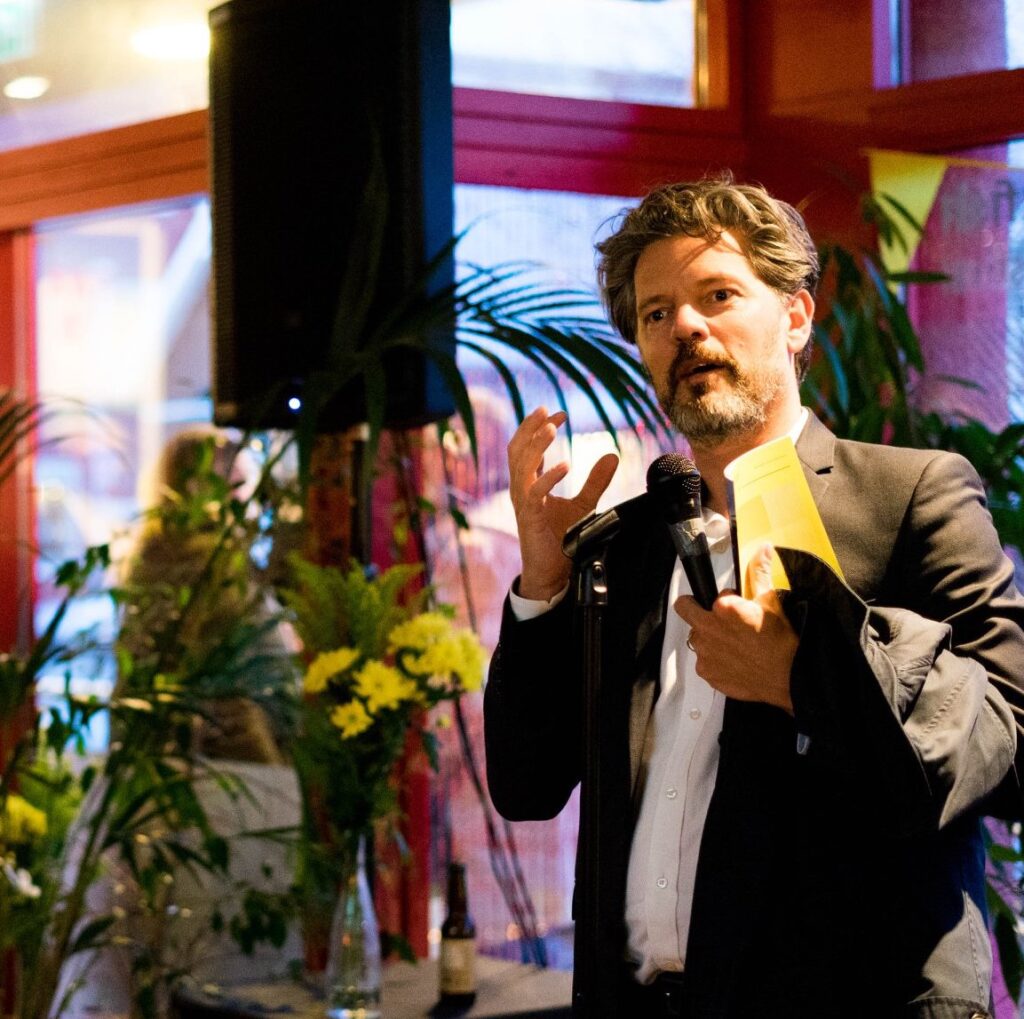
Work in Progress 2023
With support from the Icelandic Film Centre, a presentation will take place during Stockfish Industry days, showcasing works from the latest Icelandic film and TV productions.
This event will be live-streamed and recorded from the Nordic House in Reykjavík to reach professionals that can not join us in person.
Projects within the WIP aim to implement their distribution and promotional potential.
PROJECT SELECTION 2023
documentaries
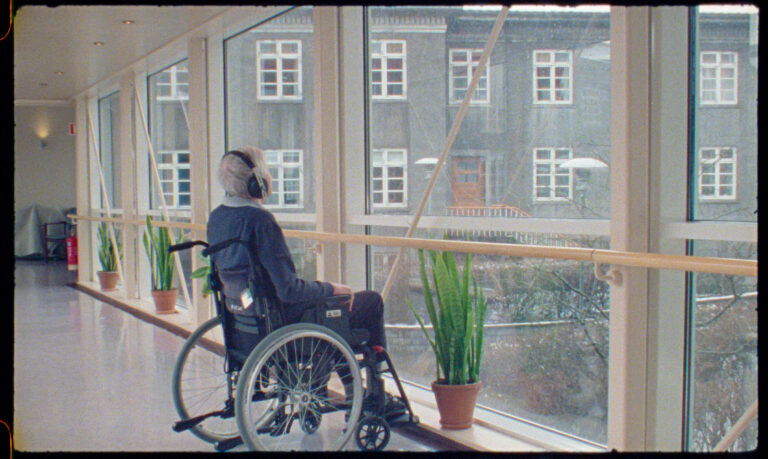
the ground beneath our feet
Director: Yrsa Roca Fannberg
Producer: Hanna Björk Valsdóttir
Original title: Jörðin undir fótum okkar
Country: Iceland, Poland
Show me the beauty and the grief of the old people at Grund! From the Earth, we come and to Her, we shall return.
There are lights in the window both night and day in this grand old building in the western quarter of Reykjavík. Grund (transl. ground) is the oldest still operating nursing home in Iceland. The Ground Beneath Our Feet shows the hidden world of everyday rituals of our elderly in what is their last home, but also an institution. We have become detached from the daily routines of the elderly, partly because we do not live in three-generation households anymore. There is nowhere to go after Grund, but the ground herself. But life prevails as long as it can.
While making films, I worked at Grund. Being with old people gives me a deep connection, meaning and joy. The residents at Grund are from my grandparents’ generation. Being so close to that generation connects me with my ancestry and grounds me in Iceland and its traditions. That is why it is important to me that the protagonists in the film are people I look after and have a real relationship with daily. That is what I want the film to portray. Old people are not very visible in our society and culture. I want to make them visible and show that getting old is part of life, with all its beauty and grief as a token of my gratitude and respect to the old people at Grund by giving them the leading role in the film. Of course, death is a big part of life at a nursing home. The first time I experienced death, was a very powerful experience that had a huge impact on me. At the very moment of death, I almost fainted. Everything went black, and it was as if all energy was drained out of me. It gave me a new perspective on life, which has stayed with me since. I see it as an important part of my job at the residency to give the old people as pleasant and meaningful time as possible, and to treat them with the dignity they deserve, including their relatives.
Yrsa Roca Fannberg has a BA in Fine Art from Chelsea College of Art, London and a Master’s in Creative Documentary from Pompeu Fabra, Barcelona. Salóme (2014, 58 min), her first documentary won the Nordisk Panorama Best Nordic Documentary award, as well as several other awards. The Last Autumn (2019, 78 min) is her first feature-length documentary and premiered at Karlovy Vary Int. Film Festival. At Nordisk Panorama it received the Jury Special Mention, also at RIFF and MajorDocs. It was screened at many major documentary film festivals. Yrsa teaches creative documentaries at the University of Iceland, organizes film screenings of documentaries at a film club in Reykjavík and is an avid analogue photographer. She started her own company Biti aptan bæði in 2016. The Ground Beneath Our Feet is Yrsa’s second feature-length documentary.
Hanna Björk Valsdóttir is a producer & director specializing in creative documentaries, with an MA in Media, Culture and Communications from NYU and a BA in English literature from The University of Iceland. As a producer, she is a two-time recipient of the Icelandic Film Award for Best Documentary and has been nominated for the same award five times. Previously working for Ground Control Productions in Reykjavík she started her own production company Akkeri Films, with a special focus on documentaries for an international audience. The first feature releases of her company were DIVE: rituals in water (2019) and The Last Autumn (2019). Documentaries produced by her have been screened at major film festivals such as Karlovy Vary Int. Film Festival, IDFA, CPH: DOX, HotDocs, DOK Leipzig, Sheffield Doc Fest, Tallinn Black Nights, Thessaloniki & Nordisk Panorama and broadcast on RUV, SVT, NRK, YLE to name a few.
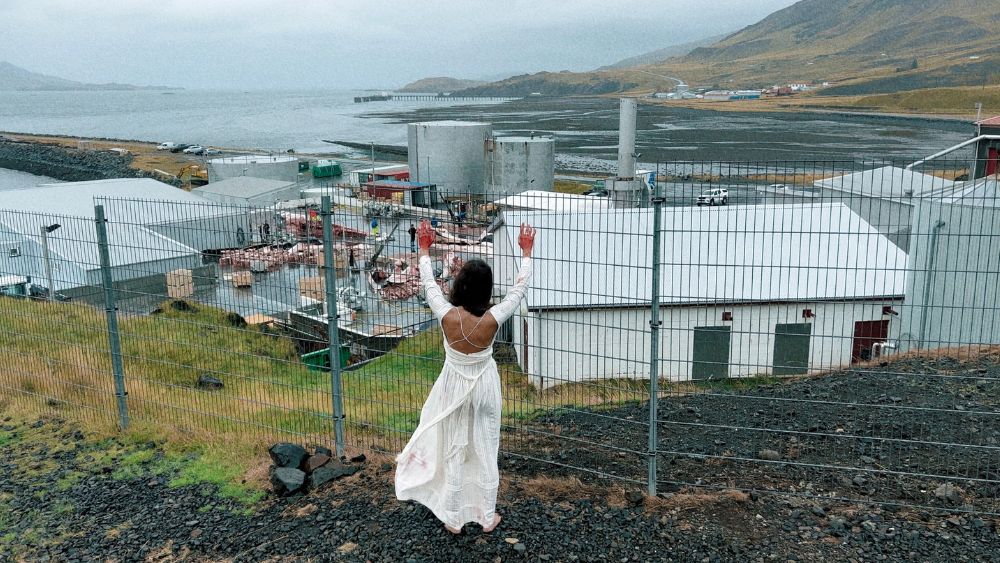
THE LAST WHALING STATION
Director: Micah Garen & Anahita
Producer: Micah Garen
Original title:
Country: Iceland, United States, Iran
The Last Whaling Station is a film about whaling in Iceland, and the last land-based whaling station in the world run by one man, Kristján Loftsson. Against strong public criticism, he continues to hunt fin whales, the second largest mammal on the planet and one critical to the survival of all species.
The Last Whaling Station is a feature-length documentary film that follows the journey of Iranian artist and activist, Anahita Babaei, as she tries to stop commercial whaling in Iceland. With her creative partner and co-director, Micah Garen, they work not only to document the killing of fin whales but also to devise a plan to stop it. Fin whales are the second largest animal on the planet, and one critical to our survival. Fin whales are a keystone species, fertilizing the oceans and sequestering 33 tons of carbon in their lifetimes.
They are also endangered. Most whales killed are female, and many are pregnant, a poignant fact that connects with another passion of Anahita’s – the struggle for Women, Life, and Freedom in Iran.
The Last Whaling Station is the lead film in the limited documentary series, How to Survive the Climate Apocalypse. We have been filming for the past year around the world including Svalbard, Sweden, the Faroe Islands, Norway, Italy and Croatia.
Filming on The Last Whaling Station is 75% complete, and we are at a 26-minute cut (sample reel). We intend to get to a rough cut of 50-60 minutes by March with the material we have already filmed while working on filming Act III of the story in Iceland this spring. We plan to reach a solid rough cut and end of the story by early summer, and a fine cut by September in time for the Sundance deadline.
We as co-directors met in the Swedish Arctic while working on two different creative projects tackling the same issue – the indigenous Sami relationship to the natural world. We quickly found a strong connection in our shared concern for the climate and a strength in the differences in our perspectives and talents. The combination of east and west, masculine and feminine, art and activism and so on. Micah Garen is an award-winning filmmaker, photographer and writer with twenty years of experience as a documentary filmmaker.
Anahita has strong experience in art, philosophy, activism and the fashion world, and together we form a human, harmonious and sometimes humorous duality in our filmic approach to telling stories from the front lines of the climate crisis. There is beauty, truth and immediacy to our artistic approach. While we have high standards for cinematography and the craft of filmmaking, we are not precious about the approach. There is a raw edge to our work, whether it involves dancing with fishermen on a bottom trawler in the Adriatic or getting into an argument with the Icelandic whaler at three in the morning in the pouring rain. At the same time, fin whales are being cut up. For Anahita, an artist from Iran who can not return to her country, the climate crisis also has a strong resonance with what is happening with the woman-led revolution there. The climate crisis itself is in large part a result of a patriarchal world system that has treated nature as a commodity while subjugating the planet. Even the last whaler of Iceland is killing mostly female whales, many of whom are pregnant. Our artistic approach puts a strong emphasis on the social, psychological and philosophical concepts that we all need to come to terms with if we are to find common solutions.
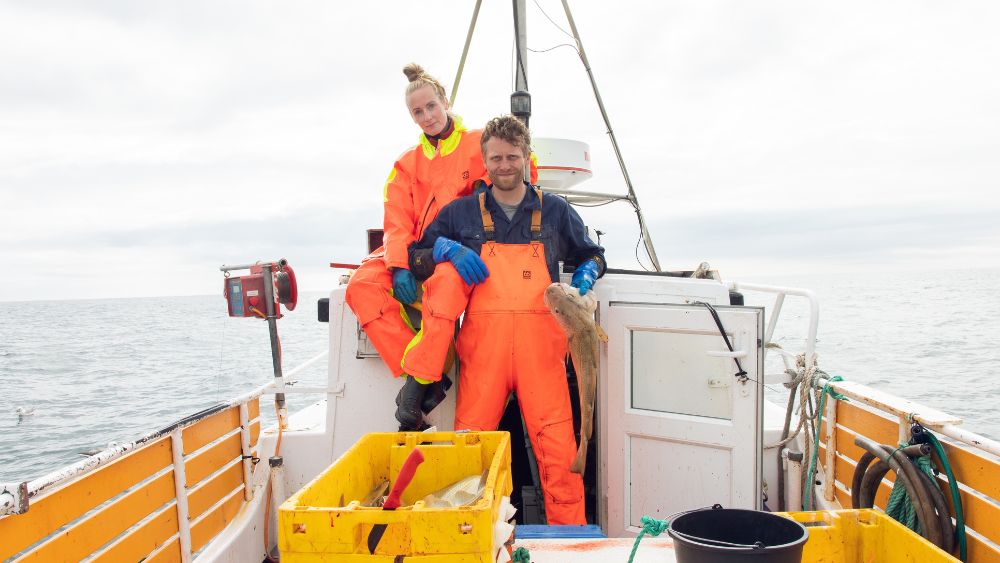
skuld – for the love of cod
Director: Rut Sigurðardóttir
Producer: Rut Sigurðardóttir
Original title:
Country: Iceland
A young couple risks their financial situation and relationship when they start working as independent fishermen, catching cod by the coast of Iceland, on their small fishing boat, Skuld.
Kristján and Rut, risk their financial situation and relationship when they start working as independent fishermen, catching cod off the coast of Iceland, on their small fishing boat, Skuld. They’re armed with a line and a hook, just like the first Icelandic settlers.
During the hunt, Kristján strives to teach Rut, a beginner in the field, everything he knows. They don’t always agree, neither of life nor cod… but these two terms seem to become the same in their world.
We follow the small fishing boat Skuld and its crew of two throughout the fishing season.
Their adventure is coloured by the lively fishermen at the harbour, their experience and their views. It is expected that not everything will go smoothly and it is not at all certain whether all this hard labour will pay off.
Rut, the director/producer, is one of the two main characters in the film, along with her partner, Kristján, who is also the composer and performs the film’s score. They are both starting to become independent fishermen, therefore are both a part of the fishing community and the film’s subject.
Fishing with a hook on a line made the colonization of Iceland possible, and it can therefore be said that it is the nation’s oldest industry. This industry of small fishing boats has declined in the 21st century and there is great uncertainty about its future. The fishermen are getting older and fewer with each passing season and it’s difficult for newcomers to enter the field. Therefore it is not only the story’s protagonists’ debt situation that’s dependent on the fishing season’s success, but its outcome is also an indicator of whether the small fishing boat industry has a future in Iceland.
Rut thinks it’s very important to put the spotlight on this type of industry and community of fishermen. It’s an integral part of Iceland’s history as well as being a basic human right, going out to catch fish in your local fishing grounds, a right that has been under a big threat in recent years and not at all certain if we’ll be able to keep on practising it if things will go on as is. is the director and producer of the film SKULD – For the Love of Cod.
She is an Icelandic independent filmmaker who has made a name for herself as a photographer, both in Iceland and in Berlin, where she studied, lived and worked for some time. After moving back to Iceland and working in the field of photography for some years, she began to mix filmmaking with her work, specializing in documentaries and TV shows. She also teaches filmmaking at the Icelandic Film School.
Among her works are UseLess – a documentary on food and fashion waste (director of photography) which has received several awards around the world, including Iceland’s best documentary 2019, and A Song called Hate – a documentary on Hatari’s Eurovision song contest adventure (filming crew) which has also received several awards worldwide, including Iceland’s best documentary 2021.
FEATURE FILMS
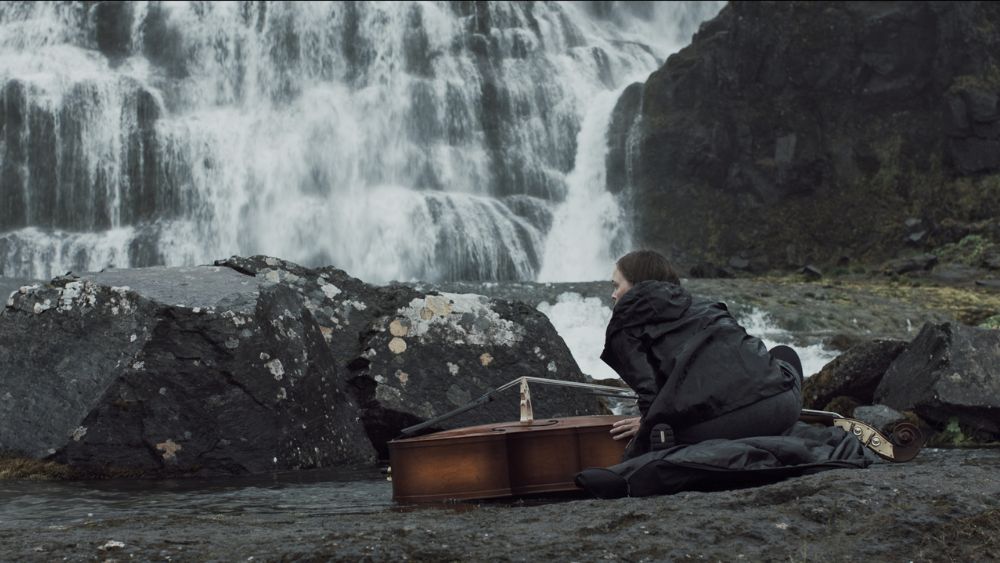
flowers to the bone
Director: Kristín Björk Kristjánsdóttir
Producer: Heather Millard
Original title: Blóm Inn Við Beinið
Country: Iceland
Flowers To The Bone takes a dreamlike/magic real look at creativity and all its fantastical ways to walk a person back home to their heart.
Ísold throws her contrabass into a waterfall. The bass is fished from the sea below and ceremoniously buried in the family plot in Unaðsdalur, a remote valley in the West fjords of Iceland to where she has returned after living abroad for 10 years. To her loved ones, in the inspiration sanctuary / lovingly crafted seaside Coffee Cabin hosted by Ylur -a rockstar in secret, Ísold reveals her intention behind this strange ritual. A grand gesture signifying the end of a way of life that had spiraled out of control with her work as a film composer at the centre, and loved ones either lost or mildly forgotten in a relentless haze of projects that were not all a matter of life and death, even though they were treated as such.
In reconnecting with her place of birth, family, friends and nature, Ísold finds a new way of moving through life where there is space for love and music anew in a much simpler space of integrity.
The film is made in memory of all the great artists that worked too much and died, in the hopes that more compassion for tending to a healthy creative spark becomes standard procedure.
Processing any kind of loss, whether it be the loss of a loved one or loss of faith is never easy. To me, films and music are my saving grace when it comes to that. Some things are just easier sung than said. And so “Flowers To The Bone” is a suggestion of how we can tap into our playful qualities in transforming grief into the grace that holds space for families to come together through creative rituals.
If someone sees this film and makes a connection to their own lives where they discover a way to heal their tragedies through creative acts, however surreal, then I will have succeeded.
Like all my films, “Flowers To The Bone” is an act of love. This time for that which remains with us at times of loss. So rather than lamenting what or those who have passed, I like to gently move on in the certainty that love does not die.
At the heart of the film lies a happening where a woman surrenders her contrabass into a waterfall and in doing so creates an opportunity for her family to find each other anew and to restore the balance within and between themselves anew after a loss of a loved one.
Kristín Björk Kristjánsdóttir / Kira Kira – Filmmaker and Musician.
She comes from a playful background of explorative music, arts and creative filmmaking, moonlighting between writing and directing her films and scoring films and TV shows.
Her feature music documentary “Grandma Lo-fi” won the Sound & Vision Award at CPH Dox and was screened in over 300 international film festivals, including at MoMA’s Documentary Fortnight, SXSW, IFFR, BAFICI and many more. “We The Lightnings” is her first narrative short, a slice from the universe that is her debut feature fiction “Flowers To The Bone” set to be filmed in ’22. Kira Kira composes music for film and TV in her homeland as well as internationally, including “Dream Corp LLC” -a hybrid animated sci-fi TV series from the producers of “The Office” created for Cartoon Network / Adult Swim.
Kira has 5 solo albums to her name as a recording artist, released internationally on various labels like Berlin’s Morr Music, Tokyo’s Afterhours and California’s Time Released Sound and she has toured worldwide in various incarnations performing the music from these albums -solo as well as with ensembles of musicians and visual artists.
Collaborating with innovative musicians, animators, playful filmmakers and dancers is a passion of hers, honed in her days as co-founder of Kitchen Motors -A playful music collective and label focused on explorations in music which she spearheaded for a decade alongside composers Johann Johannsson and Hilmar Jensson.
I am incredibly intrigued by Kristín‘s visual storytelling approach and her journey to this short film, as a way to expose and play with the minds of creative individuals. Blóm inn við beinið (Flowers to the bone) is an interesting hybrid for the life of creative souls and how they must be nourished to grow. I believe the film will offer a way to connect with the creative minds of artists whilst offering a colourful visual feast for the audience along the way.
Co-founder of Compass Films, Iceland, Heather Millard has produced a variety of internationally award-winning documentary films, feature films and service produced international television series. Heather has been working in the film & television industry in the UK since 2005 and relocated to Iceland in 2009 where she continues to produce international content.
Her feature films and theatrical documentaries include Of Good Report (TIFF 2013),
YARN (SXSW 2017) and Future of Hope (IDFA 2010). Her productions have been licensed internationally to broadcasters and SVOD platforms and released
theatrically in numerous territories. Heather recently completed the Icelandic feature film Summerlight and then comes the night directed by Elfar Adalsteins, and the hybrid feature BAND directed by Álfrún Örnólfsdóttir and currently in post-production with the feature film KULDI (COLD) and pre-production with the children’s animated television series Ormhildur the Brave a co-production with NDR, Germany.
Heather Millard is a member of the European Film Academy and was Iceland’s Producer on the Move in Cannes 2015. Heather is currently reading for an MBA in European Film Business and Law at the Film University and University of Potsdam in association with EPI Germany.
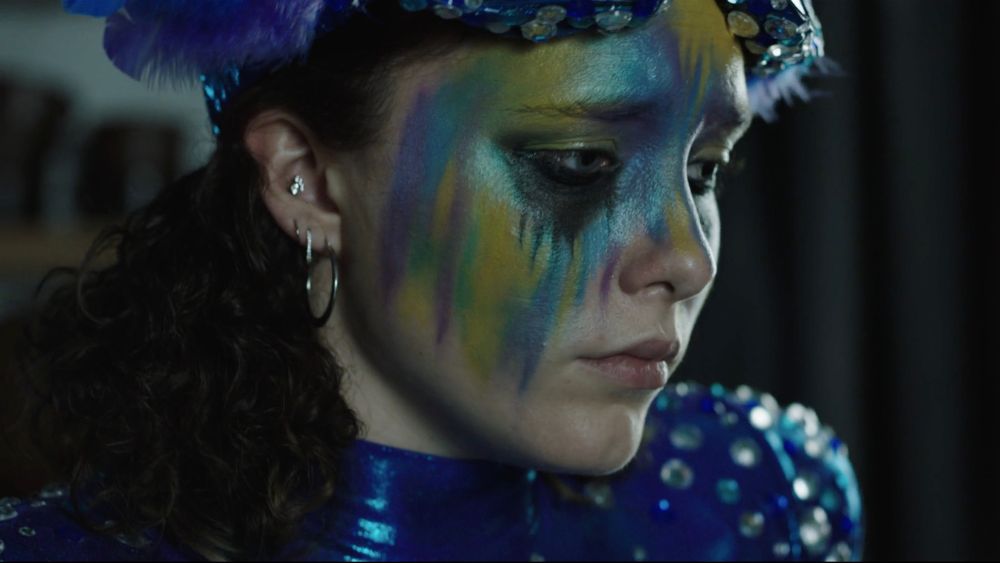
natatorium
Director: Helena Stefánsdóttir
Producer: Sunna Guðnadóttir
Original title:
Country: Iceland
A young girl stays with her grandparents in the city while she auditions for an art performance group. When the family, who have not met for a long time, gather to celebrate her acceptance into the group, an ugly family secret emerges and the evening ends with a tragedy that nobody could have foreseen.
In NATATORIUM, a film based on events and people from my environment, decorated with my imagination, I take a big and exciting leap forward as the approach is both physical and cognitive. My attraction to anomalies in human behaviour, obsessions, addictions, syndromes and dysfunction started when I began researching Tourette syndrome and kleptomania while writing the script to my film Anna (2007). Every street since, my curiosity and interest have grown and drawn me deeper and deeper into the dark, yet fascinating, the world of obsession and disorders. Natatorium is a chapter in an experimental journey that I call A choreography for the camera, where I seek to use the camera as a dancer. I want to tell a touching, yet thrilling family story where the stage, the characters and the camera work together in one choreographic whole. The camera will travel around the spaces, like the actors, in a floating choreography, in a harmonious mixture of point of view and the outside eye. My goal is to allow the viewer to feel the camera and at the same time experience a journey through the spaces by getting the feeling that he/she is the camera (observer). In Natatorium, I seek to create a film that is a treat for the senses and the mind. A film that nourishes the heart as well as raises questions about life. I seek to create a fantasy world and at the same time, tell the story of a family that the viewer can relate to.
Helena was born in Reykjavík and has lived there most of her life. She got her training in acting and directing in Paris and her MFA in video art in Gothenburg, Sweden. She has run her own production company, Wonderland films, since 2003. Alongside making short films and documentaries, she has worked as a freelance video artist, making videos for all the biggest theatres in Reykjavík, the opera and smaller independent theatre companies. Helena has a background in dancing which is the foundation of her development into becoming an experimental film director who likes to explore human behaviour in connection with visual style and movement in space.
Natatorium is an art-house drama with strong thriller elements. It is directed by Helena Stefánsdóttir and produced by Sunna Guðnadóttir for Bjartsýn Films. Co-producers are Heather Millard for Silfurskjár and Julio Elomaki for Tekele Productions. The film is supported by The Icelandic Film Centre and the Finnish Film Institute in association with RUV, YLE and SVT. Cinematographer is Kerttu Hakkarainen, the editor is Jussi Rautaniemi, the production designer is Snorri Hilmarsson, and the sound designer is Björn Viktorsson. Music is composed by Jakob Groth. The film was shot in September and October 2022 and is currently in post-production.
Sunna holds a BA degree in Psychology from the University of Iceland, MA in Cultural Management from Bifröst University and graduated in Film Production from New York Film Academy in 2018. Sunna now runs her newly established production company BJARTSÝN FILMS, which has a feature film in post and various projects in development.
After graduating from New York Film Academy Sunna worked for Join Motion Pictures for 2 years on films such as A White, White Day (2019) and Beautiful Beings (2022).
Prior to pursuing her career in film production, Sunna worked as a project manager with the Department of Culture at the City of Reykjavík for several years. Sunna co-founded Icelandic Cinema Online in 2009, the first streaming service in Iceland, focusing on Icelandic content.
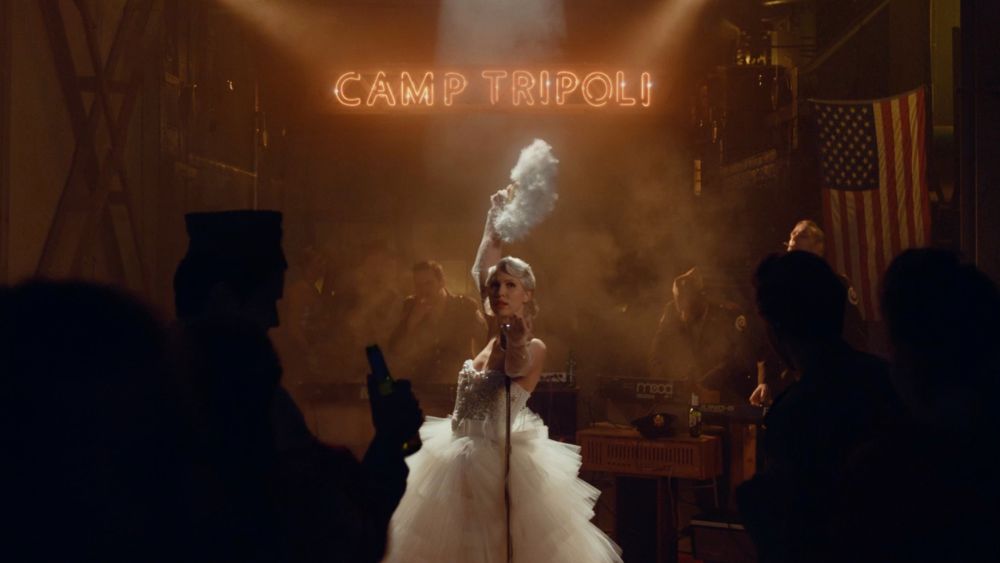
camp tripoli – not a love story
Director: Siggi Kjartan
Producer: Thelma Torfadóttir
Original title:
Country: Iceland
Rós’s sister is one of the several women abducted in the brutal reality of Occupied Iceland during World War II. She heads down a dark path trying to discover the truth behind the disappearances.
Both older sisters of Rós have been disappeared by the Youth Surveillance Unit, a fascist police branch, for having had supposed relations with US soldiers stationed in Iceland. Although always having been opposed to the stigmatized military dances, Rós has an insatiable need to discover where they’ve taken her sisters. She gets no aid from her parents or the Youth Surveillance Unit and ends up seeking the help of a young Marine in navigating a slippery path of awful truths of the World War II Iceland Occupation.
This story is essentially about my family. It’s about all the women that were scrutinised and violated during “The Situation” in Iceland. It’s about both parts, the aggressors and the survivors. Who interestingly happened to be mostly women.
Instead of portraying this period accurately, I want to exaggerate and stylize these crazy phenomena, to bring what’s beneath to the surface. Making it even a bit timeless, since these are universal and timeless topics. I want to make the US Marine club a utopian techno club where you can be free to contrast it with the grey and oppressed reality of Iceland in the 40s. I want horrible agents of the Youth Surveillance Unit to wear stylized and scary uniforms to not hide what they stand for but on the contrary, bring it to the surface.
I want to tell a story about normal people that exist in this bizarre situation, not the people making decisions or in power. The silent mass. I want to dissect friction between generations, which seems to be an ever-curring leitmotif, whatever year it might be. The older generation seems to want to perpetuate their own disappointments and unhealthy approaches to life onto their children, who fight back, but in the end, make peace with their conditioned condition and do the same to the next generation.
Siggi Kjartan was born on a dark night on a small island in the North Atlantic and often jokes about that darkness somehow still lingering in him.
In his work, he likes to study characters that isolate themselves from others, emotionally or geographically, mostly to understand himself.
Siggi has worked as an assistant director for the last decade in Iceland, France, Ukraine and the US. He has 1st AD’d both critically acclaimed indie films such as A White, White Day (2019), Agnes Joy (2019) Sparrows (2014), TV series such as Sisterhood (2021) and Stella Blómkvist 2 (2021) as well as commercial productions such as HBO’s Succession, Netflix’s July 22 and Sky Atlantic’s Fortitude amongst others. This has given him enormous insight into physical filmmaking, scheduling and most importantly what you can do for your budget.
Siggi got his BA at the University of Iceland and an MFA in Film Directing from CalArts. He was chosen to participate in the workshop for young directors in both the prestigious La Fémis in Paris in 2017 and dffb in Berlin in 2016.
Camp Tripoli is in the pre-production/financing stages. We’ve gotten screenwriting grants from the IFC and done a 7-minute proof of concept with a development grant. We felt like it was immensely important to be able to showcase the aesthetics, style and tone. The story world isn’t realistic, but rather an exaggerated version, almost an alternate reality. The content of the story breaks out in the visual akin to fx. Handmaid’s Tale.
The film is an important piece for Icelandic society, as these horrendous acts of human violation haven’t been brought to terms fully, if at all. It does, however, have a universal appeal, since it’s a human story about being powerless towards unjust prevailing powers.
We’re looking for a US-producing partner as the two main characters of the story are American and the story could have a commercial appeal in US markets.
We’re currently budgeted at 2,3M EUR, hoping for a full grant from the IFC, a 35% rebate and planning to bridge the gap with private equity. We’re scheduled for 35 shooting days, with at least half being shot on a sound stage build. We haven’t locked down creatives which give us an advantage in discussion with producing partners.
Thelma Torfadóttir is an up-and-coming producer that has helmed several short films, music videos and commercials, for artists such as Bríet, GKR and Auður and clients such as Land Rover, Moncler, Asahi & Turkish Airlines.
She did a stint in the AD department on several high-profile productions such as Netflix’s Against the Ice & The Witcher along with several local productions which granted her a precious inside into physical production.
Lately, she’s been working in development with Mike Goodridge’s UK outfit Good Chaos and just recently resurfaced after having seen their latest foray Touch by Baltasar Kormákur through a complicated 3-country production.
Thelma has been involved with Camp Tripoli from the concept stage and plans on bringing it in front of audiences very soon.
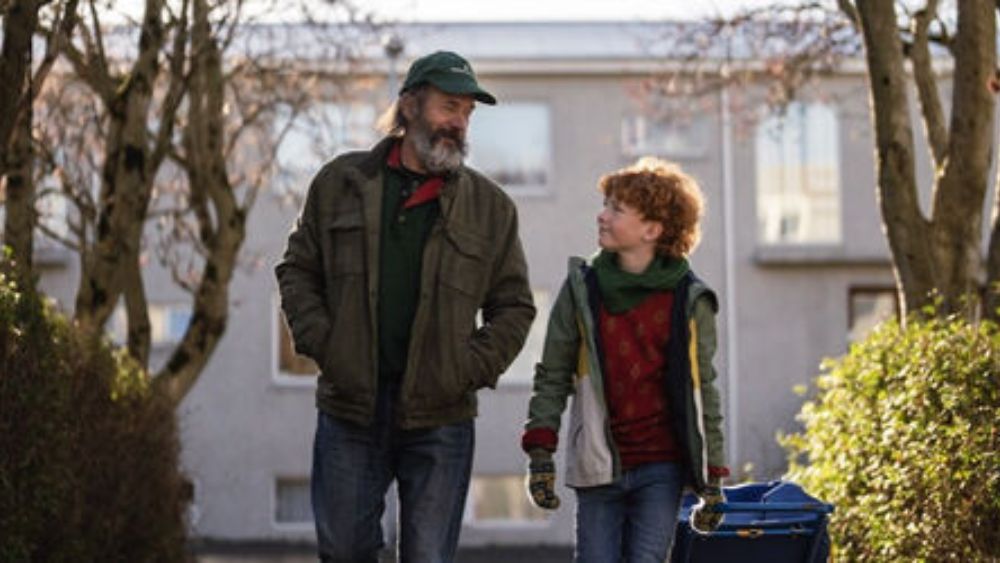
solitude
Director: Ninna Pálmadóttir
Producer: Hlín Jóhannesdóttir
Original title: Einvera
Country: Iceland, Slovakia
Gunnar is forced by the state to sell his country home. He leaves without looking back, abandoning his horses to relocate to the capital. He soon meets 10-year-old Ari and their friendship proves to be transformative for them both.
Gunnar (60) lives a solitary life in the Icelandic countryside. The state decides to seize his land for a power plant, paying him a substantial amount for the land. Gunnar has no option, gives his horses to the neighbour and drives to the capital without looking back. He moves to a quiet suburb, keeping to himself until the paper delivery boy, Ari, who is also new to the neighbourhood decides to befriend him.
They share common interests such as chess, curiosity for the news and philosophising. Ari’s parents recently divorced and he lives with his mother across the street. Ari’s mother welcomes Gunnar to take care of her son from time to time, especially since Ari’s father is hard to be seen. An incident then complicates things dramatically. Ari’s father becomes involved and Gunnar realises this is out of his hands.
Bewildered by this he drives back to his old home, only to see that life travels in periods and this one was behind him. He returns, to find peace in his new life.
My passion is to tell simple, heartfelt stories. I take interest in human connections and the impact they have – and I have found a strong bond between my short films, Paperboy and All dogs die and Runar´s script. Reading it I realised how aligned we are as storytellers. Gunnar and Ari face an uncertain political climate and a paranoid society seeing everything and everyone as a threat, something quite alien to their honest nature. At the story´s heart is the fear of vulnerability and facing one’s feelings. Gunnar’s inability to grieve his lonely past life and open up to new connections and Ari’s inability to grieve his separated family. I want to highlight how sincere their relationship becomes in a chaotic world. Importantly I want to enhance the lightness and humour in the story. These elements were present when I started and my focus is on interesting story progression and powerful visual language, creating beautiful friendships audiences relate to and will remember onwards.
Ninna Pálmadóttir is an award-winning Icelandic filmmaker.
She graduated with an M.F.A in film directing/screenwriting from NYU Tisch School of the Arts in 2019, and holds a B.A in film studies and literature from the University of Iceland. She grew up in a small town in north Iceland, surrounded by magnificent and raw nature that formed her style and personality in the arts.
Ninna‘s short film ‘Paperboy’ (2019) has been screened at various film festivals around the world, premiering at the 45th Seattle International Film Festival.
In 2019 ‘Paperboy’ won the ‘Best Icelandic Short’ award at the Reykjavík International FilmFestival, was invited to the César Award’s ‘Les Nuits en Or’ short program and was selected to screen at TIFF’s Short Cuts: Share Her Journey Shorts, event. ‘Paperboy’ was awarded ‘Short of the Year’ at the 2020 Icelandic Film & Television Academy Awards, Eddan. Ninna was a participant in European Short Pitch 2019 with her thesis script ‘All Dogs Die’ and is a 2019 recipient of the Spike Lee Production Fund for the same project. ‘All Dogs Die’ premiered at Reykjavík International Film Festival 2020, and Zagreb Film Festival 2020 as well as being one of 10 chosen projects for Karlovy Vary’s EFP’s ‘Future Frames’ program 2021.
Ninna was a ‘New Nordic Voice’ nominee at the 2021 Nordisk Panorama Film Festival in Sweden and is currently in post-production on her debut feature-length film ‘Solitude’.
Solitude is an original screenplay written by Runar Runarsson, who is undisputedly one of Iceland’s most eminent and successful contemporary filmmakers, not least for the way he conveys stories and characters in his scripts.
Ninna Palmadottir is a film director of the younger generation, she has made two impressive short films that have travelled globally, receiving numerous awards and brilliant reviews. By joining these two artists in the way of Ninna directing a film by Runar’s script we cannot but feel both excited and proud. We simply know we will make some magic with this film. Runar trustfully handed the script over to Ninna who has enriched it with her own artistic voice and their cooperation has been impressive to watch. Solitude manifests many things at once in a smoothly flowing-story. There are interesting layers to it and opportunities for the audience to interpret and the main thread is clear and translates well.
Humanity, connections with nature, the purpose of life and the need for relations are strong themes that come together in this beautiful script, which also has a subtly humorous side. The main actors Throstur Leo and Hermann are wonderful in their respective roles as Gunnar and Ari.
The great reaction at the Les Arcs Coproduction market 2021 where the film won the Arte Kino award triggered an enjoyable production with Jour2Fete and nutprodukcia with support from Iceland, Slovakia and NFTF.
We expect it to receive attention from Ninna’s generation of film-oriented young people, from Runar’s fans, from word of mouth and simply because it will be a great film.
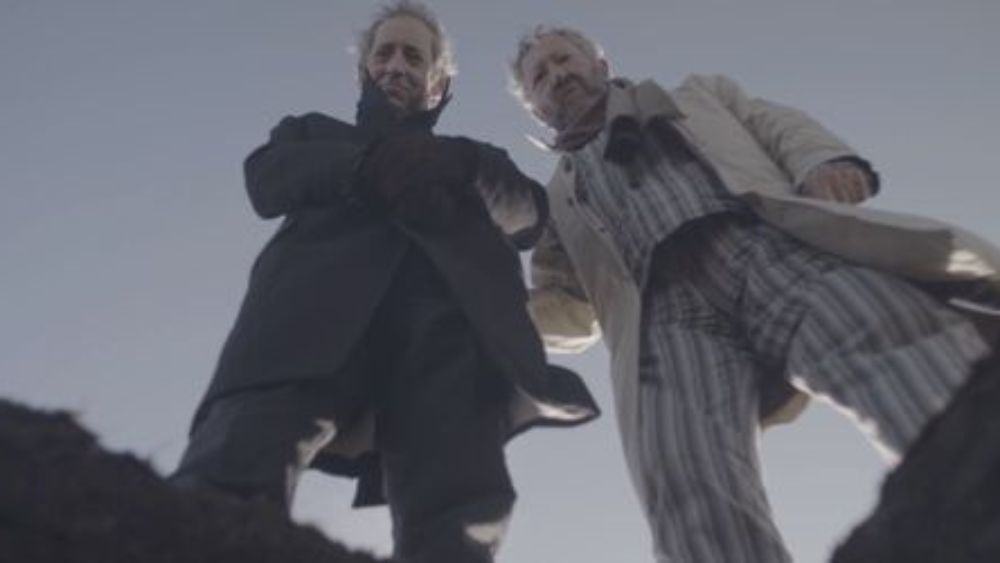
loss
Director: Ari Alexander Ergis Magnússon
Producer: Friðrik Þór Friðriksson
Original title: Missir
Country: Iceland, Norway, Belgium
An old man comes home with the ashes of his dead wife in an urn. As he waits for the kettle to boil, the relentless hissing of boiling water brings to mind memories. There is nothing ahead for the old man, only a lack of purpose, a sense of loss and loneliness. He embarks on a journey.
Guðbergur Bergsson’s novel, Missir (1932), explores the theme of mortality and how we cope with the loss that inevitably follows. It portrays the journey of an elderly man grieving the death of his pianist wife, who had gradually lost her memories and dreams. He tries to fill the void by pouring her ashes into a cup of hot water daily, a ritual reflecting his obsession and longing for her. However, he is able to reunite with her metaphorically through vivid recollections.
The film adaptation of the novel highlights the universal nature of loss and grief, as we all experience the pain of separation from loved ones at some point in our lives. The changing seasons play a significant role in the film, symbolizing the cyclical nature of life and death. The sound and image create a sensory experience that conveys the protagonist’s emotional journey.
As a filmmaker and a visual artist, I was inspired to visualize the novel’s themes and reflect on my own experiences of loss. The film captures the mystery of human consciousness, which makes life simultaneously magical, beautiful, and painful. Ultimately, the old man sails into a dreamscape where he is reunited with his wife, offering a poignant message of hope and resilience in the face of mortality.
Ari Alexander Ergis Magnússon was born in 1968 in Reykjavik, Iceland, to an Icelandic father who was a playwright, film and theatre director and a Siberian-Yakutian mother who is an actress and visual artist. His mother graduated from the acting school GITIS in Moscow and his father graduated from the legendary film school VGIK where his parents actually first met. They moved to Reykjavik, Iceland from Moscow in 1966 after his father lost faith in the utopian dream of the USSR.
Magnússon lived in Aarhus, Danmark 1979-83. He moved to Paris in 1989 and studied at the Sorbonne University 1990-91. He earned a BFA in fine arts from Parsons Paris School of Art and Design, 1991-96. Since then he has exhibited his paintings, installations and video work in galleries in Iceland, Denmark, France, England, the USA, China, Argentina, Russia and Siberia.
Magnússon has written, directed, produced and co-produced documentary films from 1993, he calls them The Cultural Thriller Movie Series and they have been shown all around the world. He has received several awards and was nominated for the Nordic Council Film Prize in 2005 for his documentary Screaming Masterpiece, an international film festival darling led by Björk and Sigur Rós.
Magnússon premiered his first narrative feature film MIHKEL, at the 2018 Busan International Film Festival in South Korea, in competition at the Warsaw International Film Festival in Poland, and cinema release in Estonia and Iceland the same year. A dramatic film based on a real-life tragedy that took place in Iceland in 2004, involving two childhood friends from Estonia: Produced by Fridrik Thor Fridriksson, Evil Doghouse, Amrion Production and Truenorth with full production support from KMÍ the Icelandic film Centre and development support MEDIA Programme of the European Union.
Ergis Film Production was established in 2002. The company’s focus has been on documentaries, mostly on artists, and the company has been involved with major working artists: Björk, Erró, Sigur Rós, Gudbergur Bergsson, Thor Vilhjálmsson, Ólafur Elíasson, Sigurdur Gudmundsson, Alain Robbe Grillet, David Lynch, Kristján Gudmundsson, Matthew Barney and Yoko Ono. Magnusson has worked closely with a team of experienced professionals: producer and film director Fridrik Thor Fridriksson, Los Angeles-based film producer Sigurjón Sighvatsson, writer Jón Proppé and co-director of the Serpentine Gallery in London, Hans Ulrich Obrist.
Epilogues is a co-production between Iceland, Belgium, and Norway that brings together an exceptional cast of veteran actors to explore the topic of ageing and loss. Shot in the rain and snow of Reykjavík, Iceland, and the foggy, green, and partially sunny Faroe Islands.
Based on the critically acclaimed novel LOSS by Gudbergur Bergsson, one of the giants of Icelandic literature, the film tells the story of an older man who has recently lost his wife. By mixing her ashes in a cup of hot water and drinking it, she appears to him, and he reminisces about their life together. With the help of his cheerful neighbour, the old man embarks on a journey to find a foothold and a purpose in life, encountering an array of colourful characters along the way.
What sets Epilogues apart is its exceptional cast, led by the 84-year-old actor Þorsteinn Gunnarsson, who brings the main character, the Man, to life in a beautiful and sincere way. Alongside him are an assembly of veteran actors including Guðrún S Gísladóttir in the role of the Wife who as a young actress played Maria in Tarkovsky’s “The Sacrifice”. The other actor, Sigurður Sigurjónsson, in the role of the Friend played one of the lead characters in the successful Icelandic film “Rams”. Tómas Lemarquis and Árni Pétur Guðjónsson, also add depth and complexity to this already compelling story.
Throughout the film, the audience is mesmerized by the stunning cinematography of Bergteinn Björgúlfsson, and the score, composed by Gyða Valtýsdóttir, adds another layer of emotional depth to this already powerful story.
Epilogues is a highly relevant film in today´s society, exploring a topic that is often overlooked but ever so relevant: losing one’s partner late in life. The main target audience is educated men and women between the ages of 30-80 years primarily. Epilogues(LOSS) was first presented in 2020 as part of New Nordic Films during the International Film Festival in Haugesund, Norway. In 2021 New Nordic Films in collaboration with Cannes’ Marché de Film selected Loss to be one of 29 projects from all over the world to participate in its Coproduction Day.
Epilogue is a beautiful and thought-provoking film that explores important themes about ageing and loss, with an exceptional cast and stunning cinematography. The fact that it is based on a book by one of Iceland’s most important authors and has been selected for important co-production markets is a testament to its quality and relevance. In our view, the audience will want to explore the film‘s themes as well as experience its beauty and poignancy.
Fridrik Thor Fridriksson started his filmmaking carrier with a series of experimental films and documentaries in the early 1980s. In 1987, he founded The Icelandic Film Corporation, which was Iceland’s most important production company for over 20 years, producing Fridrikssons films as well as working with other Icelandic directors and producers. Through Fridriksson’s international reputation, the company built a network of internationally well-established co-production partner companies, including Lars von Triers Zentropa and Francis Ford Coppola’s American Zoetrope. As a director, Fridriksson gained international recognition and critical acclaim with his second feature „Children of Nature (1991)“ which was nominated for an Oscar as Best Foreign Language Film.
Growing up in Iceland in the sixties, Fridriksson was influenced by American films but his exposure to Kurosawa’s works as well as European cinema was of crucial importance in his decision to become a filmmaker. Fridriksson has a degree in Fine Art and during his college years, he ran a film club and an art gallery. Fridriksson has been acclaimed for the strong visual style of his films and his gift for stunning images. His films combine a wry sense of humour and genuine solidarity with the characters. Fridriksson’s films are both deeply personal and have a strong rooting in Icelandic culture often depicting characters at the crossroads of tradition and modernity.
Uniquely Fridriksson’s films have both touched a chord with local audiences in Iceland who have flocked to see Fridriksson’s vision of themselves (more than 50% of the Icelandic population saw his film, ‘Angels Of The Universe’, released in 2000) as well as moved audiences from a wide variety of cultural backgrounds.
Fridriksson’s own identity as a filmmaker is that of a storyteller within a tradition that goes back to the writers of the Icelandic Sagas, more than a thousand years ago. Fridriksson’s films have been a great influence on younger generations of Icelandic film directors.
For the past three decades, Fridrik Thor has been one of the driving forces behind the development of the Icelandic film industry as well as playing a pivotal role in nurturing new talent as a producer.
TV SERIES
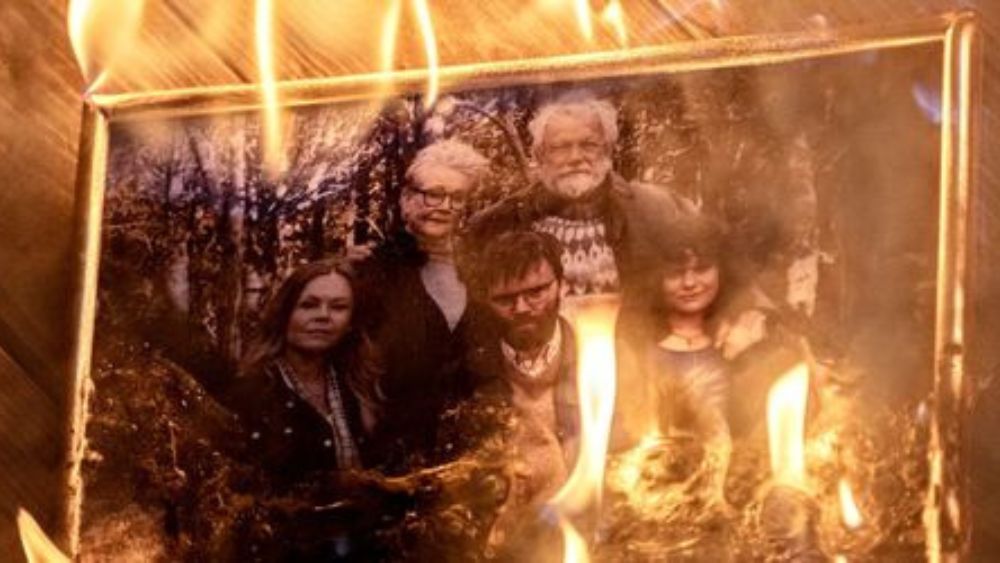
descendants
Director: Tinna Hrafnsdóttir
Producer: Guðný Guðjónsdóttir, Kidda Rokk & Tinna Hrafnsdóttir
Original title: Heima er best
Country: Iceland, Belgium
After the banking crisis, the travel industry became a desirable goldmine in Iceland. When three very different, middle-aged siblings inherit the successful whale-watching company and the beautiful summerhouse their parents built, things become extremely difficult. To take joint decisions about a legacy to which they all feel entitled to, creates complex circumstances, and when they start to manipulate what they are to share, old wounds open up with dire consequences.
The reason why I want to tell stories about families is that those are the stories everyone can relate to. Family is where life begins. It’s the core of what we are made of and shapes who we become. It’s the strongest, yet most complicated, form of connection so when we see or hear stories about all the issues and complications that can arise between family members, we see ourselves. “Descendants” draws a clear picture of two generations and their differences, but the need to belong and be accepted by our parents or the people we need the most is what drives the conflicts. Award-winning series like Succession, Bloodline, Herrens veje and This is us, are our strongest references for those series also focus on family bonds, inner conflicts and strong characterization.
Tinna is an Icelandic director, actress, writer and producer.
She is an alumnus of Iceland University of the Arts, Reykjavik University (MBA), TIFF Filmmakers Lab and runs her own film production company, Freyja Filmworks.
The series is produced by three emerging production companies, Polarama (delegate producer), Freyja Filmworks and Projects.
Tinna Hrafnsdóttir is an established director, actress, writer and producer at her own production company Freyja Filmworks. Tinna has written and directed two award-winning short films, Helga 2016 and Munda 2017, and her first feature, Quake which world premiered at Tallinn Black Nights Film Festival in 2021. Descendants is Tinna’s first series as a co-writer, director, actress and producer.
Producer Guðný Guðjónsdóttir holds an MBA from San Diego State University. Guðný was CEO and CFO of Sagafilm in the years 2007-2017. Since 2017, she has run her company Projects ehf. which is a consulting and production company. Guðný has worked on numerous projects, varying from drama, documentaries, animation, features, and production services. Guðný was the executive producer of Case and an executive producer of Tulipop Tales among others.
Producer Kidda Rokk (Polarama) holds a BA degree in social sciences. She was a producer at Sagafilm in the years 2016-2020, where she was, among other things, a producer on the project Thin Ice, which was a Swedish project that was worked on in co-production with Sagafilm. As an independent producer before that time, she worked on projects such as The Tunnel (UK), Fortitude, Trapped and Game of Thrones, Pawn Sacrifice, Noah and Batman Begins.
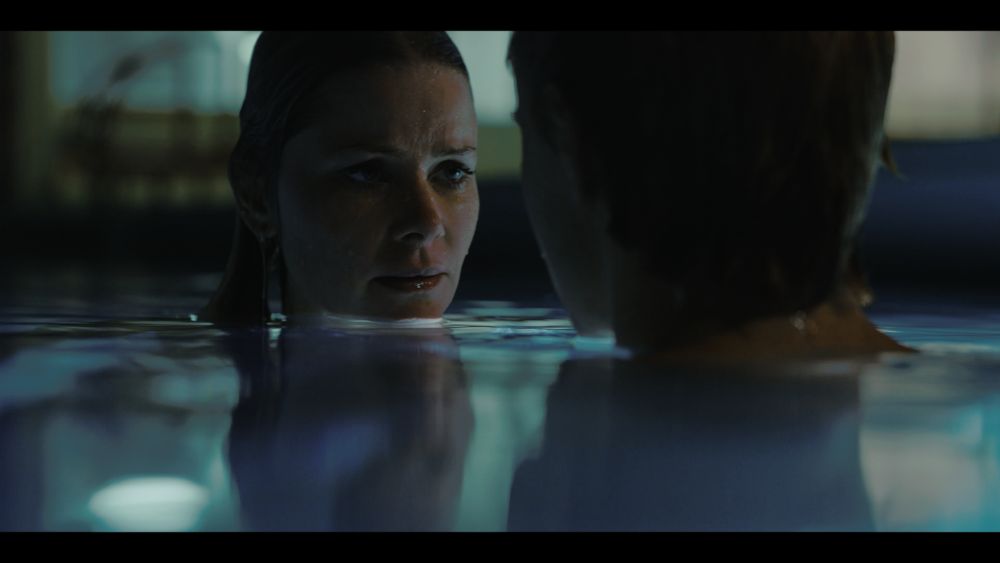
as long as we live
Director: Katrín Björgvinsdóttir
Producer: Arnbjörg Hafliðadóttir
Original title: Svo lengi sem við lifum
Country: Iceland
Beta, a once-promising musician finds herself in a stale marriage, struggling to be the mother she wants to be. When her new au-pair, a young boy, introduces these little “flirting assignments”, Beta is forced to take risks and re-enter the world.
As Long As We Live is the every-mans love story. Good people doing their best but have found themselves in a dark hole after 8 years of marriage.
Beta is a powerful, creative soul with a very vivid imagination. She’s dug herself into a hole in her marriage always trying to fit in the box she thinks social norms require of her. She goes to great lengths not to repeat her parents’ mistakes, who had a nasty divorce 20 years ago and still suffer the consequences. Beta puts a beastly pressure on herself to be the generation who does better than their predecessors and not “fail” at this marriage thing as her parents did.
As Long as We Live is a tremendously strong and important contemporary female story about issues that are personally very important to me as a single, childless, heterosexual woman in my 40s. I am, like most women of my generation, conditioned to let me dream of the classic endgame: love and having children, thus guaranteeing basic happiness for the rest of my life. But the older I get and watch my peers go on this journey, the more realistic I see this dream and I can’t help but put a question mark on all of this. I watch my friends struggle to meet undefined demands as wives and mothers; all-encompassing, unconditionally loving beings who are always there and in order to get to this point they erase themselves, put life on pause and sacrifice themselves to have to mother a child, often partnered with a man who doesn’t seem to have the same need to uproot himself in order to find himself in this role.
Katrín Björgvinsdóttir graduated as a director from the National Film School of Denmark in 2019. Her graduation film Queen Ingrid won the Special Mention Award at the Nordic Talents competition the same year. Katrín works both in Denmark and in Iceland as a director and screenwriter and her recent directorial work includes the miniseries Chemobrain II (2020) for the Danish television station TV2 as well as three episodes in the third series of Entrapped which was released on Netflix 2022.
Glassriver is an independent and experienced film & television production company. Recognised as a creative powerhouse in Iceland, the owners’ respective work has accumulated over 50 film awards domestically and internationally. Since its establishment in 2016, Glassriver has become one of the most productive and proficient production companies in Iceland.
With relatively few but extremely talented full-time employees, the company hires close to 1000 contractors for temporary projects every year. Glassriver prides itself in creating and delivering on-schedule quality content to both film and TV markets worldwide. Glassriver’s latest releases include the acclaimed television series “Black Sands”, which was selected for world premiere at Berlinale and has been commissioned for subsequent seasons. Furthermore, the eight-part medical drama “Fractures”, the fifth season of the popular comedy “Ordinary People”, the first season of the acclaimed television series “Journey” and the second season of “My funeral”. The company is currently developing close to 20 other TV and Feature Film projects, genres ranging from comedy to sci-fi. Most notable in the development line are the thrillers, “Black Sands 2″ and “The Trip”, the nostalgic comedy “Magaluf” and the high concept project “Prison Island”.

